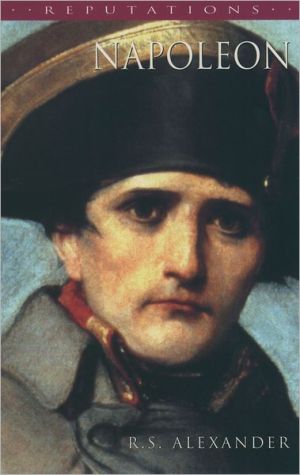

 |

|

The average rating for Napoleon based on 2 reviews is 4 stars.
Review # 1 was written on 2016-04-23 00:00:00 Chris Little Chris LittleA positively fantastic overview of the development of how we reflect upon Napoleon. I'd suggest brushing up on 19th-Century French political history first though to make a few things process more clearly. |
Review # 2 was written on 2009-02-12 00:00:00 Jamie Salas Jamie SalasThe Forging of a Rebel was always imagined by its Spanish author as a single ambitious work. However, it was first published in England, where Barea was living in exile, as three separate volumes: The Forge (1941), The Track (1943) and The Clash (1946). Arturo Barea's hope was to present for European and American readers a personal, but pointedly Spanish view of the Spanish Civil War. Franco, a fascist on the Mussolini model and a ruthlessly competent military leader, accepted critical aid from Hitler and Mussolini, weapons, advisors, and some combatants. When western democracies took a non-interventionist stance that was fatally damaging to the republican side, anti-fascists from throughout Europe and the Americas stepped up, creating a motley army of amateurs and forging a fragile coalition of political interests that would soon be unbalanced by the Soviet Union's agreeing to supply planes, tanks, ammunition, and officers to the Spanish government. Stalin's minions brought some badly needed order and discipline but they also brought politically motivated purges, organized for "safekeeping" the removal of the government's gold from its treasury, and quickly substituted its interests for Spain's. In short, a civil war became two wars, one belonging to Spain where there was no alternative to victory for either side and a proxy war, a prelude to the World War II, where international participants knew they could fight another day. During and after the war, the international angle dominated books, films, and articles, a fact that bothered Barea as much as it did when he worked in besieged Madrid during the war as a censor. The Forging of a Rebel is Barea's superb attempt to re-direct the world's attention to the true origins and nature of the Spanish Civil War. Barea, the son of a washerwoman, was raised by a strict aunt and a kindly uncle and held apart from his still living mother. The aunt discouraged visits from the mother and displays of affection between mother and son. Barea, a capable student, was bright and curious, instinctively independent, resistant to authority, and determined to free his mother from the grim life of a laundrywoman. His aunt's support raised his status in the family but at a cost of periodic humiliations and angry jealousy from siblings and cousins. Spain was a dying aristocracy. Its countryside still remarkably feudal. The Church, institutionally and in most instances at the parish and school level, worked hard and harshly with the wealthy landowners. Even its generosity, which Barea experiences and acknowledges, came, as it did with his aunt, at a price of conformity and acceptance of one's inferiority. Anti-clericalism among the Spanish poor was deep and rooted in support of a status quo that left many brutally exploited, working long hours on starvation diets and frequently underemployed. Attempts at reform were repressed. The Forge tells the story of Barea's family life, education, and experiences in city and rural village, including an influential uncle who was a blacksmith'hence the double-duty of the first's volume's title. The first volume concludes with Barea's career in a bank, which began with an exploitive apprenticeship (a year's worth of free labor as one of scores of apprentices working in competition for three low-paying jobs) and continued with a slow rise in the business world. The second volume tells of Barea's time in the Spanish army in Morocco'where we encounter Franco for the first time'and the corruption, callousness and violence in the Spanish colony. The third volume covers the Spanish Civil War. All three volumes are intriguing and very well written (and ably translated by Barea's wife) and Barea was successful in using his life story to reveal the long roots of the civil war and the personal, political, and occasional indifference that contributed to his horrible violence. Barea intercedes to save a fascist priest and a wealthy business owner, both because they were men of good character who helped others, regardless of political views or status, but there are many others on both sides who are executed on suspicion or by accident or out of malice or revenge for past crimes real and imagined. On both sides. Franco's partisans kill union men and women or anyone with a moderate republican or leftist affiliation. Barea soon becomes suspect by the Communists, as does Ilsa, thought to be a Trotskyite, and the couple is forced to flee Spain to avoid arrest and likely execution by their own side. It is a compelling story of the war and an engaging, provocative and very personal memoir of one man's life in Spain in the first third of the 20th century. Excellent. |
CAN'T FIND WHAT YOU'RE LOOKING FOR? CLICK HERE!!!